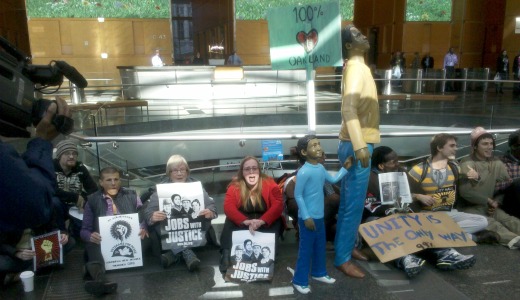
PHILADELPHIA – “We want Comcast to pay its fair share.” These were the words of Diane Mohney, one of the protesters arrested last Wednesday as she was being hustled out of the Comcast Center downtown.
The group, dubbed the “Comcast Nine,” sat down in the lobby of the city’s tallest skyscraper with their signs and were supported by a large crowd of demonstrators outside the building. Their supporters could look in but were barred from entering after guards and police realized that a protest was underway.
The nine were taken out in handcuffs and charged with “malicious trespass” after refusing several warnings to leave the premises. Their action garnered extensive press coverage and focused public attention on the basic issues being raised by the Occupy Wall Street movement. Press reports noted that the sit-in occurred “hours” after the Comcast announced third-quarter profits of $908 million and total revenues of over $14 billion, nearly a 5 percent increase over a year earlier. Occupy members told the press that they chose the Comcast building because the firm pays no property taxes, having benefited from Philadelphia’s property tax abatement program which allows companies constructing new buildings to avoid property taxes for 10 years.
Mohney, a retired school nurse, told the People’s World after her release from custody early the following morning that the protesters intended to highlight the contradictions between the profits of one of the nation’s cable giants and the poverty that increasing numbers of Philadelphians are experiencing personally including public sector workers.
She recalled that Philadelphia has been cited as one of the nation’s hungriest cities. Philadelphia’s municipal workers, members of two AFSCME locals, have worked without a new contract for over two years. Also, on the same day that the sit-in took place, the city’s public school administration announced plans to close nine schools in the coming year with possibly more closures in the near future. The city’s public schools are already reeling from the deep budget cuts imposed by the administration of Gov. Tom Corbitt in Harrisburg and generally rubber-stamped by local school district leaders.
The nine arrested were joined by a tenth, when a woman was arrested outside while attempting to block the police vans taking the others to the “Roundhouse,” the Police Administration building. They represented a diverse cross-section of the Occupy movement. Of the original nine, two were women, both leaders of the local Jobs with Justice chapter, which has actively supported the Occupy Philadelphia movement. Mohney is JwJ’s community co-chair and Gwen Snyder is its executive director.
Occupy Philadelphia has so far had civil and peaceful relations with the police, Mayor Michael Nutter and local authorities. In fact, the mayor stated at the occupation’s outset that the issues the movement was raising were issues that should concern everyone. Police Commissioner Charles Ramsey has said that peaceful protest should be dealt with peacefully.
Mohney suggested that the nine protesters felt it was important to make the point that, while the tolerant attitude of the authorities was welcome, the underlying issues driving Occupy Philadelphia were not being addressed. Demonstrators mentioned the contradiction between the right of free speech and free expression and the police protecting the private property of one of the nation’s media giants.
Warren Davis of Philadelphia Jobs with Justice contributed to this story.
Photo: Activists hold Jobs with Justice signs including Diane Mohney (left) and Gwen Snyder who are among the group sitting in at Comcast Center in downtown Philadelphia. Warren Davis/PW.


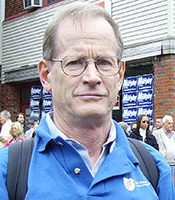
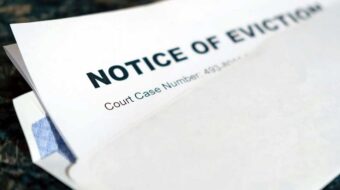
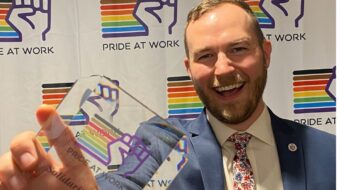
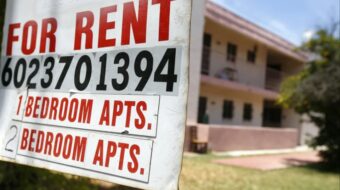






Comments